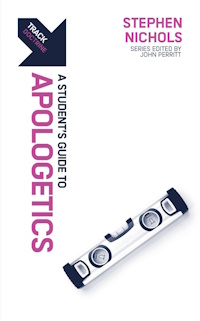A Studentís Guide to Apologetics
It can be tempting to run away from hard questions, whether we’re asking or being asked. Stephen Nichols’ short book A Student’s Guide to Apologetics is a helpful introduction to answering some of those hard questions with grace and truth. ‘We don’t need to run away from hard questions. We can run right into those hard questions because we have answers’ (8–9).
 The book begins by showing the relevance and necessity of apologetics. As Nichols puts it: apologetics is ‘giving answers, making a defence for the Christian faith’ (12). So, in a world where there are many questions and criticisms flying around, from the world at large and from our friends, we need to know how to begin to give answers.
The book begins by showing the relevance and necessity of apologetics. As Nichols puts it: apologetics is ‘giving answers, making a defence for the Christian faith’ (12). So, in a world where there are many questions and criticisms flying around, from the world at large and from our friends, we need to know how to begin to give answers.
After some insightful lessons from the biblical words of Peter, Mary, and Paul, the book moves onto its strongest section: three chapters on the existence of God, the reliability of the Bible, and the person of Jesus. These chapters are all understandable, concise, and fun. One highlight: read how grilled hot dogs make a surprisingly good case for the existence of God! These chapters, in just 38 short pages, are fantastic – giving answers to some of the most fundamental questions for Christianity.
The book is very easy to read. It’s concise, clear, and light.
The last two chapters go in a different direction. Chapter 5 asks the question ‘How can I be right with God?’. What is the gospel ‘that brings salvation to everyone who believes’ (Romans 1:16). Chapter 6 looks at the sovereignty of God in our evangelism. While these chapters say important things, they take up a significant portion of the book, and deviate from where you might expect an introduction to apologetics to go. The book is very easy to read. It’s concise, clear, and light. Chapters (and sentences) are short and key words are clearly explained.
There’s a lot that isn’t said in this book. There’s no discussion of the Bible’s answer to questions on sexuality, gender, or evil done in the name of Christianity. Nor does the book cover some of the questions which many students are asking in universities now: ‘Why would God allow suffering?’, ‘Is Christianity compatible with science?’, ‘Can believing in God help me in my life today?’
You won’t find any discussion on different types of apologetics: classical, presuppositional, etc. Or what you should be emphasising if you’re organising evangelistic events: engaging with pop-culture, long Bible teaching, discussions, lectures, or debates.
Rather, this short primer focuses on giving answers to fundamental questions, and to be fair, does that very well. It concisely and persuasively introduces good reasons to believe in God, trust the Bible, and love Jesus.
Nichols’ love for history comes across throughout. There are little lessons from Thomas Aquinas, C.S. Lewis, and Martin Luther. Just sprinkled throughout, these are interesting and informative. For more of this, Stephen Nichols’ weekly podcast ‘5 Minutes in Church History’ is well worth a listen.
Like a spicy chilli pepper, it packs a helpful punch in a small package
If you’re looking for a short book to explain why apologetics is important, and begin to answer some key big questions, I’d warmly recommend this book to you. Like a spicy chilli pepper, it packs a helpful punch in a small package. If you find yourself surrounded by people talking about apologetics, perhaps as a new student in a Christian Union, this book is a helpful and persuasive introduction to what that’s all about. If you want to show a Christian friend why apologetics is important and worthwhile, this would be a good book for them. As ‘A Student’s Guide to Apologetics’, this book is well worth your time.
Stephen J Nichols, A Student’s Guide to Apologetic (Christian Focus, 2023), 96 pages.



